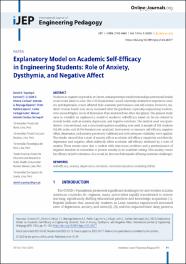Mostrar el registro sencillo del ítem
Explanatory Model on Academic Self-Efficacy in Engineering Students: Role of Anxiety, Dysthymia, and Negative Affect
| dc.contributor.author | Yupanqui-Lorenzo, Daniel E. | |
| dc.contributor.author | Olivera-Carhuaz, Edith S. | |
| dc.contributor.author | Reynaga Alponte, Antonio A. | |
| dc.contributor.author | Pulido-Capurro, Víctor | |
| dc.contributor.author | Carbajal-León, Carlos | |
| dc.contributor.author | Cardoza Sernaqué, Manuel Antonio | |
| dc.date.accessioned | 2023-10-10T17:01:12Z | |
| dc.date.available | 2023-10-10T17:01:12Z | |
| dc.date.issued | 2023-07-06 | |
| dc.identifier.uri | https://hdl.handle.net/20.500.13053/9518 | |
| dc.description.abstract | Students in engineering tend to be loners, making interpersonal relationships and mental health issues more likely to arise. The COVID pandemic caused university students to experience anxiety and depression, which affected their academic performance and self-esteem. However, students’ mental health was rarely evaluated after the pandemic, especially engineering students, who showed higher levels of depression than students from other disciplines. The present study aims to establish an explanatory model of academic self-efficacy based on factors related to mental health, such as anxiety, depression, and negative emotions. The method used was quantitative cross-sectional, and a structural equation modeling was used. A sample of 561 students (54.4% males and 45.6% females) was analyzed. Instruments to measure self-efficacy, negative affect, depression, and anxiety, previously validated and with adequate reliability, were applied. The results showed that a state of anxiety affects academic self-efficacy negatively and directly; depression and negative affect indirectly affect academic self-efficacy mediated by a state of anxiety. These results show that a student with depression problems and a predominance of negative emotions is vulnerable to present anxiety in an academic setting. This anxiety causes his efficacy beliefs to decrease. As a result, he does not feel capable of facing academic challenges. | es_PE |
| dc.format | application/pdf | es_PE |
| dc.language.iso | eng | es_PE |
| dc.publisher | INT ASSOC ONLINE ENGINEERING | es_PE |
| dc.rights | info:eu-repo/semantics/openAccess | es_PE |
| dc.rights.uri | https://creativecommons.org/licenses/by/4.0/ | es_PE |
| dc.subject | Self-Efficacy, Anxiety, Depression, Emotions, Structural Equation Model | es_PE |
| dc.title | Explanatory Model on Academic Self-Efficacy in Engineering Students: Role of Anxiety, Dysthymia, and Negative Affect | es_PE |
| dc.type | info:eu-repo/semantics/article | es_PE |
| dc.identifier.doi | 10.3991/ijep.v13i5.38577 | |
| dc.type.version | info:eu-repo/semantics/publishedVersion | es_PE |
| dc.publisher.country | AUT | es_PE |
| dc.subject.ocde | 3.03.00 -- Ciencias de la salud | es_PE |
Ficheros en el ítem
Este ítem aparece en la(s) siguiente(s) colección(es)
-
Web of Science (WOS) [236]


